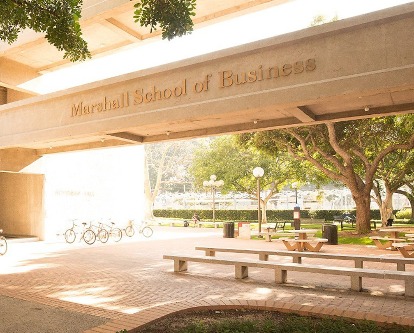
Marshall Faculty Publications, Awards, and Honors: November 2025
We are proud to highlight the many accomplishments of Marshall’s exceptional faculty recognized for recently accepted and published research and achievements in their field.
New Business of Cinematic Arts (BCA) Joint Degree
New Business of Cinematic Arts (BCA) Joint Degree
USC Marshall collaborates with the School of Cinematic Arts to offer first-of-its-kind 4-year joint degree program for incoming freshmen.

For the first time, students applying to the Marshall School of Business for Fall 2022 were able to choose the John H. Mitchell Business of Cinematic Arts (BCA) joint-degree program on the Common App. It is USC’s first true joint degree program created in partnership with the USC School of Cinematic Arts (SCA).
“It takes a shared vision and philosophy to create a joint degree,” said RAMANDEEP RANDHAWA, vice dean for undergraduate programs and professor of data sciences and operations. “The John H. Mitchell Business of Cinematic Arts degree exemplifies how we can innovate, collaborate, and build significant value for our students.”
A joint degree is fundamentally distinct from a double major; it’s a singular diploma with intentional curricular integration from two schools as a 128-unit four-year program. Students will be admitted as freshmen and complete the program as a cohort. Upon graduation, students earn a diploma that features both schools formalizing the dual credentials.
Marshall tapped Professor of Clinical Business Communication MARION PHILADELPHIA to be the program’s academic director, working with her counterpart, Assistant Dean and Executive Director of the Business of Entertainment Programs at the School of Cinematic Arts BONNIE CHI to create a more integrated and seamless pathway for future cohorts.
“The BCA cohort model adds another dimension to becoming a member of the Trojan Family,” said Philadelphia. “BCA students take their courses at The School of Cinematic Arts lockstep as a group throughout the four years. This allows them to develop deep relationships that carry on into their professional lives.”
“The entertainment business thrives on a personal network base,” said Chi. “We tell our students that networking begins when your education begins.”
“BCA students take their courses at The School of Cinematic Arts lockstep as a group throughout the four years. This allows them to develop deep relationships that carry on into their professional lives.”
— MARION PHILADELPHIA
Academic Director, John H. Mitchell Business of Cinematic Arts Program
Business of Cinematic Arts
BCA students take classes designed just for them, including courses on marketing feature-length films and entertainment law and deal-negotiation. BCA students also work closely in teams with student filmmakers, producers, and writers. A typical cohort is capped at about 50 students.
“The class size is small because this program is so high-touch,” said Chi.
In its prior iteration, as an undergraduate business emphasis, the BCA program has been offered since 1999. A $25 million gift in 2019 named the program for John H. Mitchell and helped raise its profile.
“We saw the potential and the opportunity to evolve the existing program into a true joint degree and add value to our students’ four-year experience. Students were doing serious coursework at SCA, but their diplomas didn’t reflect that coursework was done across both schools,” said Randhawa. “We asked the question: How can we do this better?”
Now that the joint degree program is listed on the Common App, the standard application used by millions of future college students, more than 800 students selected BCA as their first choice major. There are no plans to expand the program at this time, said administrators. "It's an exclusive program," said Chi.
RELATED
Marshall Faculty Publications, Awards, and Honors: November 2025
We are proud to highlight the many accomplishments of Marshall’s exceptional faculty recognized for recently accepted and published research and achievements in their field.
Research: Wendy Wood in The Independent
Wood’s research demonstrates that Instagram users who claim to be addicted to the platform actually display few symptoms typically associated with addiction.
Quoted: Nick Vyas in ABC7
In the wake of a major cargo spill and massive container ship fire, Vyas explains how early shipment of goods helped Los Angeles and Long Beach ports absorb the supply chain shock.
Interview: Marco Aponte-Moreno in KCBS
Aponte-Moreno discusses the tense situation between the United States and Venezuela and the prospect of a possible regime change in the South American country.
Cited: Michael Mische in CS Monitor
The Golden State is reconsidering its oil reserves and its policies.